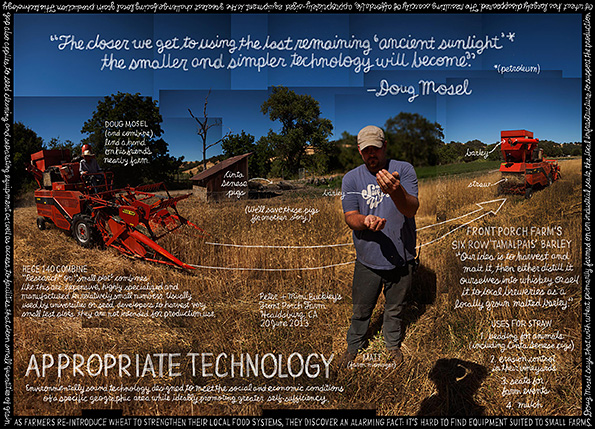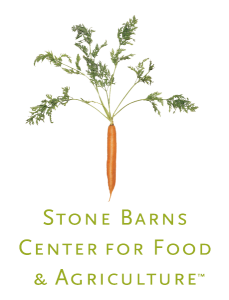
The future of farm tech is open-source. #AppropriateTechnology @deliciousliving @lexiconproject #foodlist
Appropriate technology is "a holistic approach to human problem solving," says Ian Snider of Yates Family Farm. "It involves working with nature—of which we are a part—to develop and sustain systems beneficial to the health of the whole.”
Ever since Nixon’s Secretary of Agriculture, Earl Butz, proclaimed “get big or get out,” farms and farmers in the United States have followed the logic of corporate capitalism: bigger farms, bigger tractors, and more complex and expensive technology.
A new corn harvester bought today comes decked out with proprietary computer systems and GPS monitoring. The tractors can literally drive themselves, collecting scads of production data that happen to go right back to the large corporations manufacturing these machines. This technology makes combining a thousand acre field much easier, but it often puts farmers deep into debt and removes control of their own farming systems and production information from their own hands.
Instead of homogenizing, privatizing, and commodifying our farm technologies, we must support the time-tested tradition of on-farm innovation. We must leverage technology appropriately as a tool to reduce barriers to information, and foster collaboration.
The future is open-source!
Title: Appropriate Technology
Location: Peter + Mimi Buckley’s Front Porch Farm, Healdsburg, CA
Featuring: Doug Mosel
It’s hard to find equipment suited to small farms.
Doug Morsel (pictured above) says that with wheat primarily farmed on an industrial scale, the infrastructure to support the local production of wheat has largely disappeared. The scarcity of affordable, appropriately-sized equipment is the greatest challenge facing local grain production.
Appropriate technology is environmentally sound technology designed to meet the social and economic conditions of a specific geographic area, while ideally promoting greater self-sufficiency.
The Slow Tools Project
 “The re-emergence of small-scale farming has created a need for small tractors and other tools and implements capable of performing traditional and newer farming tasks more efficiently and ergonomically,” says Barry Griffin, a design engineer who's teaming up with Stone Barns Center on the Slow Tools Project. Today’s small farmers simply cannot purchase the equipment they need to work a 30-inch greenhouse bed, for instance. They end up having to buy standard, cumbersome pieces and adapt them for their needs, hurting efficiency and very often their backs.
“The re-emergence of small-scale farming has created a need for small tractors and other tools and implements capable of performing traditional and newer farming tasks more efficiently and ergonomically,” says Barry Griffin, a design engineer who's teaming up with Stone Barns Center on the Slow Tools Project. Today’s small farmers simply cannot purchase the equipment they need to work a 30-inch greenhouse bed, for instance. They end up having to buy standard, cumbersome pieces and adapt them for their needs, hurting efficiency and very often their backs.
The Slow Tools Project is bringing together a small group of engineers and leading farmers to design, build and make available through open-source systems a host of new tools. The partners have identified 34 tools in need of development, beginning with a small electric tractor that will serve as the “motherboard” frame to which other tools can be attached.
Other inventions to follow will be the solar-powered “Horse Tractor,” which could have a significant impact among cultures dependent on draft animals (and where drought limits water availability), and a compressed-air grain harvester and processor.
“We believe that these essential pieces of equipment will help reduce the risk of failure that so many young and beginning farmers face,” says Jill Isenbarger, executive director of Stone Barns Center. “The challenges they deal with are significant: high land prices and connection to markets, for instance. Tools shouldn’t be one of them.”
 What concerns do you have about the role that technology plays in sustainable farming?
What concerns do you have about the role that technology plays in sustainable farming?
For the past three years, the Lexicon of Sustainability has sought out the foremost practitioners of sustainability in food and farming to gain their insights and experiences on this important subject. What began as a photography project to spread their knowledge has grown to include short films, study guides, traveling shows, a book, and a website where people can add their own terms to this ever-evolving lexicon. See more at www.lexiconofsustainability.com.

